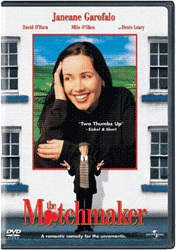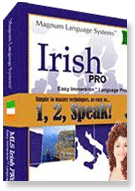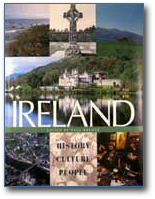Custom of The Irish Matchmaker
"Babhdóir" is the Irish word for 'matchmaker'. The custom of the Irish matchmaker
is particularly busy during "Shrovetide", which is the marrying season in Ireland.
Well into the 20th century, the busiest time for matchmaking in Ireland began
right after Epiphany on January 6th. This was because the Irish had misinterpreted
a Catholic Church ruling set forth in 1563, which prohibited weddings during
Lent. They figured that if you could not marry during Lent, then you had to
marry before. It was taken for granted that Shrovetide was the proper time
to marry and Shrove Tuesday, the day before Ash Wednesday, became the most
favored day of all.
With most weddings these days taking place on a Saturday, it may seem strange to us that just a few decades ago, marriages in Ireland would be performed on any day of the week except Saturday or Sunday. It's logical when one remembers that Ireland was a rural country and Saturday was market day when families bought and sold livestock, produce and whatever else was needed to sustain them. I don't believe that the Catholic Church would have allowed marriages on the Sabbath.
While an arranged marriage may not seem very romantic to us, many of the engaged couples had known each other since they were children, and, in many cases, feelings of affection were already established. Even though romantic love as we know it was unheard of back then, families would do their best to match a son or daughter with a mate they thought would be a compatible companion.
When the matchmaker had succeeded in having the respective families of the bride and groom agree to a union, the groom was invited to come meet his future wife. It was on this occasion that the bride's family would roast a goose in honor of the upcoming wedding. The custom was called "aitin the goose". It was a chance for the couple to become better acquainted and all involved in the wedding would be invited, including the priest.
Once a union was arranged, there would be the 'walking out', which was always chaperoned, of course. Often, the girl's parents would send a younger sibling along, on the pretense they would pick some flowers, but actually to make certain there were no liberties taken by either party. These escorts were often known as "daisy pickers".
At some point during the walking out period, another important event took place, called "walking the land". This was when the bride-to-be's parents would do an inspection of the future son-in-law's family home. Afterwards, they would be offered the hospitality of the house to make certain that the young man's family was not miserly.
Afterwards, the families would get together to do "The Bindings" or marriage agreement. This agreement could often be extremely complicated. In many cases, the bride-to-be's mother and father would include a provision that, when they were old, they would get their full need of essentials such as milk, turf, butter, eggs and a ride to Sunday Mass. While making a match is a fascinating part of Irish history and folklore, the customs surrounding the big day itself are just as interesting.
With most weddings these days taking place on a Saturday, it may seem strange to us that just a few decades ago, marriages in Ireland would be performed on any day of the week except Saturday or Sunday. It's logical when one remembers that Ireland was a rural country and Saturday was market day when families bought and sold livestock, produce and whatever else was needed to sustain them. I don't believe that the Catholic Church would have allowed marriages on the Sabbath.
While an arranged marriage may not seem very romantic to us, many of the engaged couples had known each other since they were children, and, in many cases, feelings of affection were already established. Even though romantic love as we know it was unheard of back then, families would do their best to match a son or daughter with a mate they thought would be a compatible companion.
When the matchmaker had succeeded in having the respective families of the bride and groom agree to a union, the groom was invited to come meet his future wife. It was on this occasion that the bride's family would roast a goose in honor of the upcoming wedding. The custom was called "aitin the goose". It was a chance for the couple to become better acquainted and all involved in the wedding would be invited, including the priest.
Once a union was arranged, there would be the 'walking out', which was always chaperoned, of course. Often, the girl's parents would send a younger sibling along, on the pretense they would pick some flowers, but actually to make certain there were no liberties taken by either party. These escorts were often known as "daisy pickers".
At some point during the walking out period, another important event took place, called "walking the land". This was when the bride-to-be's parents would do an inspection of the future son-in-law's family home. Afterwards, they would be offered the hospitality of the house to make certain that the young man's family was not miserly.
Afterwards, the families would get together to do "The Bindings" or marriage agreement. This agreement could often be extremely complicated. In many cases, the bride-to-be's mother and father would include a provision that, when they were old, they would get their full need of essentials such as milk, turf, butter, eggs and a ride to Sunday Mass. While making a match is a fascinating part of Irish history and folklore, the customs surrounding the big day itself are just as interesting.
 |
Disclaimer: LittleShamrocks.com is an affiliate website that receives commissions from sales of the products listed. We have purchased and sampled many, but not all, of the products on these pages.
© Copyright LittleShamrocks.com. All Rights Reserved.








